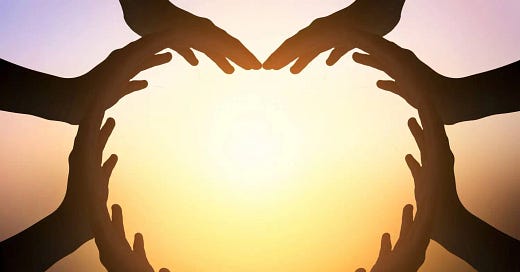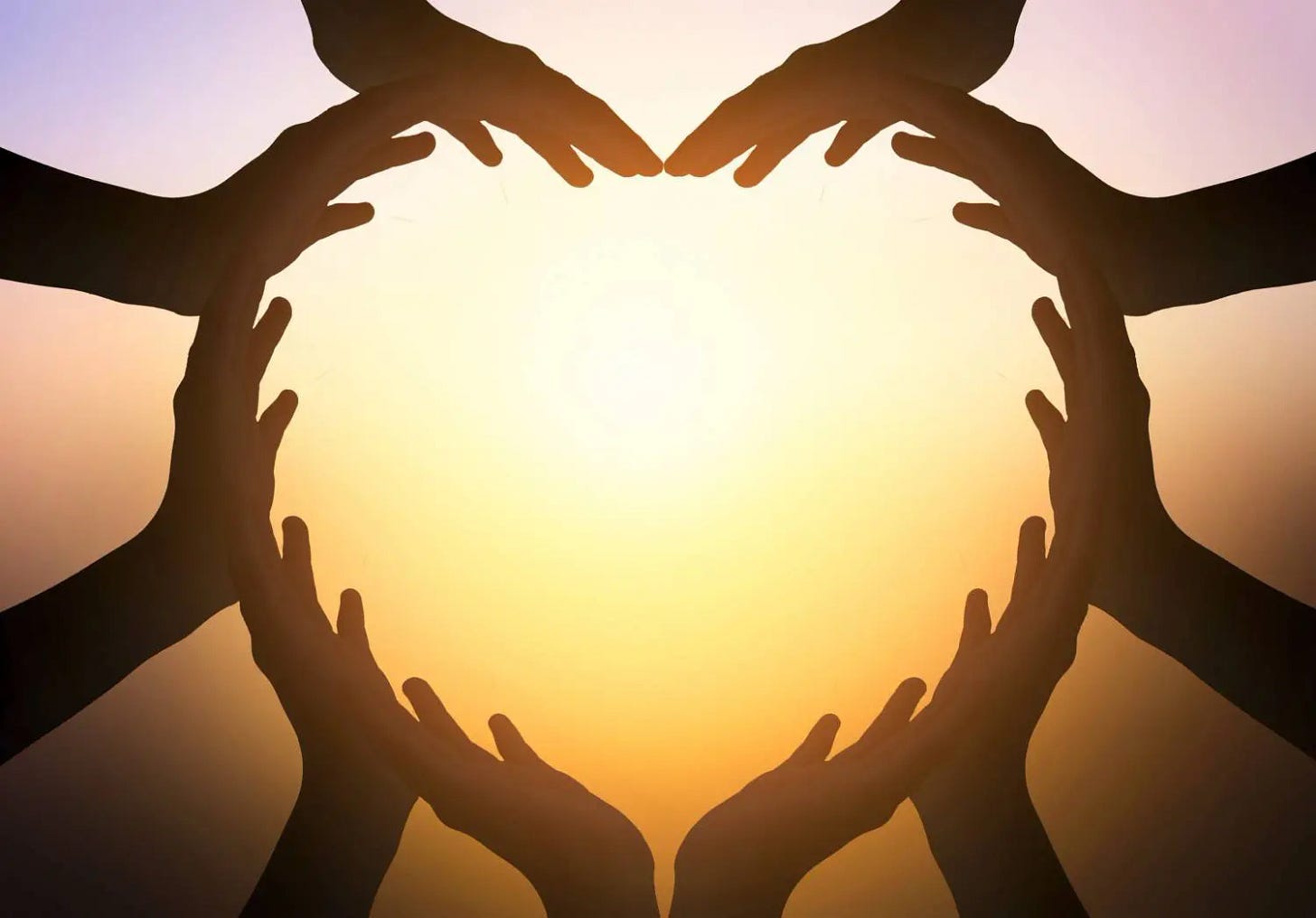I've been thinking a lot about love lately. Not the kind of intimate partner love (though I'm glad to have that in my life), but the expansive love that is wider than our personal relationships. The Revolutionary Love conference reminded me again of the power of love to fuel work for peace, freedom, and justice. But it is not new to me.
At the beginning of my embarking on a career of humanist leadership, when I was ordained as a Unitarian Universalist minister the same year I was certified as a professional Ethical Leader, a mentor and friend designed a stole for me. She was rather well known for making stoles for the many people she mentored, and always worked to individualize them to the centering philosophy of that person. Mine has hearts on it. Even then, I knew that love was a more powerful force than respect, which is the attitude humanists are more likely to talk about.
In this month when we're thinking of "story" as a theme, consider where "love" plays a part in the story of peace, justice, and freedom.
The book that I read from on Sunday, and then spoke about, Cory and the Seventh Story, is a story about stories. It's about replacing stories of different kinds of domination with a story of neighborly love. We too often, I think, avoid using the term "love," though, because it is consigned in our misogynistic culture to the female sphere. Not rational enough.
Yet it is not a new idea. Gandhi related the concept of ahimsa or nonviolence with love. And his nonviolence was not a passive nonviolence, it was often nonviolent action standing up to injustice. Not only injustice done to his own people, but those who were different from him.
The philosopher, ethicist, activist, and theologian bell hooks writes about the importance of an "ethic of love" to guide us away from the pervasive "ethic of domination" that is behind many different systems of hierarchies of power and value in our society. It's a long quote, but one that inspires me still (emphasis mine):
Without an ethic of love shaping the direction of our political vision and our radical aspirations, we are often seduced, in one way or the other, into continued allegiance to systems of domination—imperialism, sexism, racism, classism. It has always puzzled me that women and men who spend a lifetime working to resist and oppose one form of domination can be systematically supporting another. I have been puzzled by powerful visionary black male leaders who can speak and act passionately in resistance to racial domination and accept and embrace sexist domination of women, by feminist white women who work daily to eradicate sexism but who have major blind spots when it comes to acknowledging and resisting racism and white supremacist domination of the planet. Critically examining these blind spots, I conclude that many of us are motivated to move against domination solely when we feel our self-interest directly threatened. Often, then, the longing is not for a collective transformation of society, an end to politics of dominations, but rather simply for an end to what we feel is hurting us. This is why we desperately need an ethic of love to intervene in our self-centered longing for change. Fundamentally, if we are only committed to an improvement in that politic of domination that we feel leads directly to our individual exploitation or oppression, we not only remain attached to the status quo but act in complicity with it, nurturing and maintaining those very systems of domination. Until we are all able to accept the interlocking, interdependent nature of systems of domination and recognize specific ways each system is maintained, we will continue to act in ways that undermine our individual quest for freedom and collective liberation struggle.
During the pandemic, I've had a bit more flexibility to take some online courses. One of those I took was one on "Love as a Force for Social Justice" from Coursera. It deepened and enriched my understanding of that relationship. Those who know me won't be surprised that I was especially appreciative of the work included on the brain's role in promoting empathy and compassion. It turns out, for instance, that doing volunteer work, where you help someone else directly or indirectly, not only helps that person, but reinforces the part of your brain that can empathize, so you're more likely to be a helper again in the future, in other situations. (Volunteering is also good for your health, both mental and physical.)
We often think of ethics as "doing the right thing," where the "right thing" is carefully worked out logically and rationally. Without compassion and empathy, though, "doing the right thing" can be paternalistic, and can totally miss the mark of what is actually needed to relieve suffering and create liberation and justice. And don't misunderstand me: I think logic and reason are important partners in the ethical quest. Love, empathy, and compassion need reason to help make us more effective, and to allow us to maintain good boundaries and spot abusive misappropriation of the tendency to want to care and be helpful.
I'll leave you with this 20-minute video from Ruby Sales, freedom fighter and inspirational leader in the world of social justice. In it you'll hear the story of the moment two white men, one operating out of love and one operating out of hate, changed her life -- and what meaning she has learned to take from that.
Ruby Sales: How We Can Start to Heal the Pain of Racial Division





